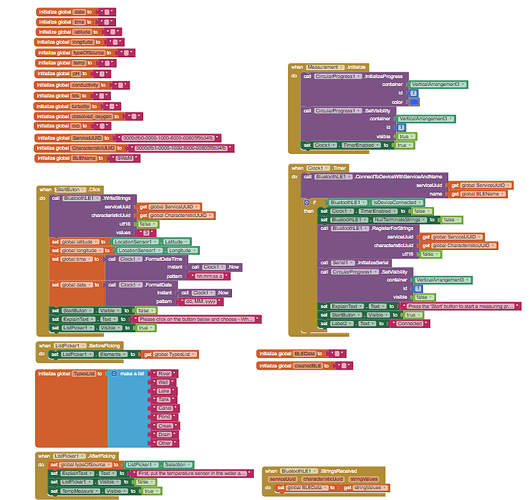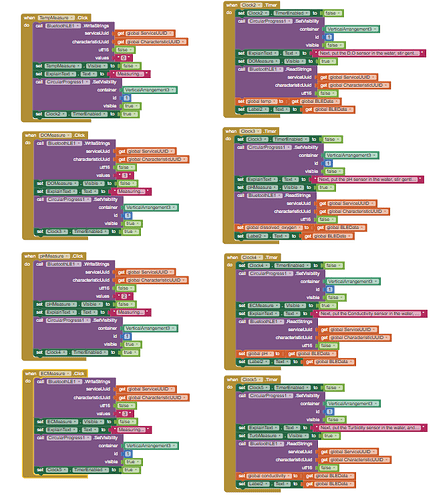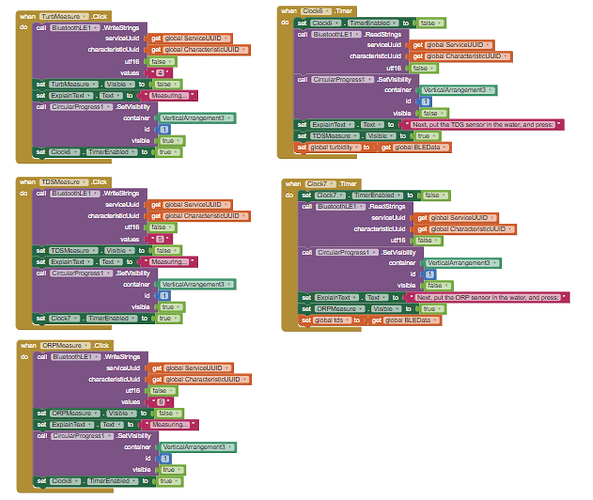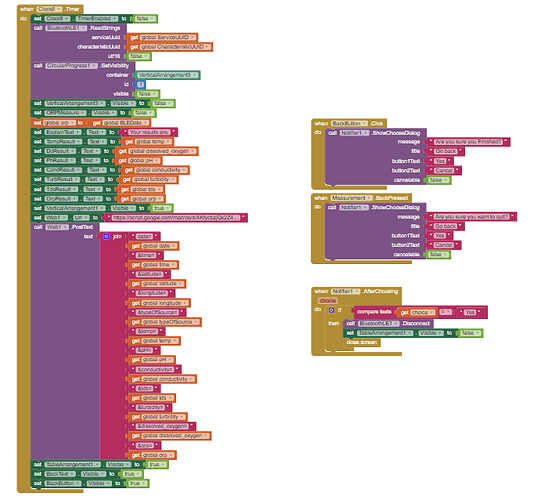Hi all,
I am trying to develop a basic app that will receive the results of water quality parameters from an Arduino (Bluno via BLE. I can connect my app to the device, and it works every time I write from the app to the device. But when I am trying to receive the data from the device - it works for the first piece of data and then fails for the rest.
These are my block:
This is my Arduino code:
#include "DO_prob.h"
#include "TDS_prob.h"
#include "EC_prob.h"
#include "pH_prob.h"
#include "ORP_prob.h"
#include "TEMP_prob.h"
#include <EEPROM.h>
#include <avr/pgmspace.h>
EC_prob ec;
pH_prob ph;
TDS_prob tds;
DO_prob DO;
ORP_prob ORP;
TEMP_prob temp;
// Defining sensors pins (analogs and digitals)
#define DO_PIN A0
#define EC_PIN A1
#define pH_PIN A2
#define TDS_PIN A3
#define turb_PIN A4
#define ORP_PIN A5
#define temp_PIN 5
#define VREF 5000 //for arduino uno, the ADC reference is the AVCC, that is 5000mV(TYP)
// More definitions
float voltagePH, voltageEC, voltageTDS, voltageDO, phValue, ecValue, tdsValue, doValue, orpValue, temperature;
String userinput; // variable to store the user input
#define ReceivedBufferLength 20
char receivedBuffer[ReceivedBufferLength + 1]; // store the serial command
byte receivedBufferIndex = 0;
#define SCOUNT 30 // sum of sample point
int analogBuffer[SCOUNT]; //store the analog value in the array, readed from ADC
int analogBufferTemp[SCOUNT];
int analogBufferIndex = 0, copyIndex = 0;
float averageVoltage = 0;
// Setup some libraries and serial
void setup() {
Serial.begin(9600);
//BTserial.begin(9600);
ec.begin();
ph.begin();
tds.begin();
DO.begin();
temp.begin();
}
// Main code
void loop() {
userinput = UserInput();
if (userinput.equals("1")) { // User is looking to calibrate
userinput = UserInput();
if (userinput.equals("1")) { // User wants to calibrate pH
ph.Calibration();
}
else if (userinput.equals("2")) { // User wants to calibrate ec
ec.Calibration();
}
else if (userinput.equals("3")) { // User wants to calibrate tds
tds.Calibration();
}
else if (userinput.equals("4")) { // user wants to calibrate do
DO.Calibration();
}
else if (userinput.equals("5")) {// user wants to calibrate orp
ORP.Calibration();
}
}
else if (userinput.equals("2")) { // User is looking to measure
userinput = UserInput();
if (userinput.equals("1")) { // User wants to measure temp
temp_measurment();
}
else if (userinput.equals("2")) { // User wants to measure pH
ph_measurment();
}
else if (userinput.equals("3")) { // User wants to measure ec
ec_measurment();
}
else if (userinput.equals("4")) { // user wants to measure trub
turb_measurment();
}
else if (userinput.equals("5")) { // User wants to measure TDS
tds_measurment();
}
else if (userinput.equals("6")) { // User wants to measure DO
do_measurment();
}
else if (userinput.equals("7")) { // User wants to measure all
// TO DO
}
else { Serial.println("Try again. Make sure you insert the number of the measurement");
Serial.println();
}
}
else if (userinput.equals("3")) { // User is looking to measure all in at once
userinput = UserInput(); // Temperature ,^C
delay(7000);
temperature = temp.readTemperature();
Serial.println(String(temperature));
userinput = UserInput(); // Dissolved oxygen ,mg/L
delay(5000);
doValue = DO.readDO((analogRead(DO_PIN) / 1024.0 * 5000), temperature);
Serial.println(String(doValue));
userinput = UserInput(); // pH
delay(5000);
phValue = ph.readPH((analogRead(pH_PIN) / 1024.0 * 5000), temperature);
Serial.println(String(phValue));
userinput = UserInput(); // Electrical conductivity ,ms/cm
delay(5000);
ecValue = ec.readEC((voltageEC = analogRead(EC_PIN) / 1024.0 * 5000), temperature);
Serial.println(String(ecValue));
userinput = UserInput(); // Turbidity ,NTU
delay(5000);
float voltage = analogRead(turb_PIN) * (5.0 / 1024.0);
float turbidity = -1120.4 * ((voltage) * (voltage)) + 5742.3 * (voltage)-4352.9;
Serial.println(String(turbidity));
userinput = UserInput(); // Total dissolved solids ,ppm
delay(5000);
tdsValue = tds.readTDS((analogRead(TDS_PIN) / 1024.0 * 5), temperature);
Serial.println(String(tdsValue));
userinput = UserInput(); // ORP TO DO
delay(5000);
orpValue = ORP.readORP();
Serial.println(String(orpValue));
delay(5000);
}
}
// Function to read the user's input
char UserInput() {
while (Serial.available() == 0) {}
char input = Serial.read();
Serial.println(input);
return input;
}
Label2 is just for debugging, so I can see in real-time if it works. For the TempMeasure I get the correct string. After that, I get the String that was sent for the previous measurement (DOMeasure receives "0",pHMeasure receives "1", etc.)
Any ideas about what can it be?




